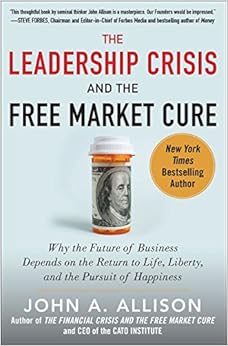 Integrity is being trumped by pragmatism, both in business and in politics. Yet, being rationally principled—having integrity—is a crucial requirement of human success, and pragmatism—discarding principles for expediency—leads to failure in the long term. Why?
Integrity is being trumped by pragmatism, both in business and in politics. Yet, being rationally principled—having integrity—is a crucial requirement of human success, and pragmatism—discarding principles for expediency—leads to failure in the long term. Why?
As fallible beings with no automatic knowledge of the right goals or the means to achieve them, we need to discover, by using reason, the knowledge our survival and flourishing requires. Knowledge of the simplest requirements of survival and thriving is not automatic to us. What foods are good to eat? Which ones meet the nutritional requirements of long-term heath as well as enjoyment? A pleasing taste is not a sufficient indicator; scientific research in many areas is required to discover knowledge of proper nutrition. Similarly, medical research is required to discover complex knowledge needed to find cures for illnesses. And to create the material values (including food and medicine), we need to discover the knowledge necessary to grow and operate businesses profitably.
Given the limits to the knowledge we can hold in the in conscious awareness at any given time, it is necessary to condense and integrate knowledge in a retainable form. If properly done, based on observation of facts and logic, our knowledge will be held as general principles that will guide our actions to achieve values: nutritious, tasty food facilitating long-term health; medicines to cure illnesses facilitating survival and well-being; and a variety of goods and services facilitating the survival and flourishing of both their consumers and producers. Principles in all fields of human endeavor, from nutritional science, medicine and other sciences to business are needed to help fallible beings to achieve values in the long term, such as health and business success. Principles help to project the long-term consequences of our actions and thus to make concrete choices in any given situation that help achieve our long-term values.
Despite the tremendous survival value of following principles, many people opt for pragmatism—abandoning rational principles that guide long-term goal achievement for a short-term gain. This happens both in business (think of the owners of unsoundly constructed, collapsing garment factories in Bangladesh or of any business person who has tried to profit by deceiving customers or investors) and in politics. The recent election results in my home province Alberta provide some lessons on the value of integrity and the destructiveness of pragmatism.
After a 44-year uninterrupted reign, the Progressive Conservative (PC) party was defeated into a near-oblivion by the socialist New Democratic party (NDP). The PCs continually violated their avowed principles of fiscal conservatism and small government, by increasing both spending and government’s size. They also tried to circumvent the principle of checks and balances in government by welcoming the leader of the opposition (the also conservative Wildrose party) and a number of her caucus members to join them. The opposition leader who agreed to the deal was, of course, also culpable for compromising integrity for potentially gaining more power. In contrast, the NDP leader came across as principled, although she hardly qualifies as a paragon of integrity, given the irrationality—and destructiveness—of her socialist principles that will not help achieve any values consistent with the requirements of human flourishing but will destroy them instead. Projecting consistent principles still helped her win over the Alberta voters who will likely regret their choice, should the NDP party stick to its principles and thus further limit Albertans’ freedom through increased taxation and regulations.
Any political or business leader who wants to succeed in the long term needs to identify the right principles—those that are consistent with the requirements of human survival and flourishing, from moral principles to more specialized principles of politics, economics, finance, marketing, and others—and to apply them consistently. Compromising integrity—flip-flopping on principles—is the surest way to fail to achieve long-term goals, including losing the trust of voters or employees.
Given the dominance of pragmatism, it’s hard to find examples of integrity in contemporary politics and business, but Israel’s prime minister Benjamin Netanyahu probably qualifies, based on his speeches at least (my knowledge is admittedly limited here), as does BB&T’s retired CEO and Chairman John Allison, who exemplifies integrity in both talk and action. If you want to learn more about John Allison’s inspiring example of integrity in his 20 years of growing and running a very successful bank, you can read about it in my book, download his talk “Principled Leadership”, or read his latest book.
First published at How to be Profitable and Moral: A Rational Egoist Approach to Business and posted here with the kind permission of the author.
Jaana Woiceshyn teaches business ethics and competitive strategy at the Haskayne School of Business, University of Calgary, Canada. She has lectured and conducted seminars on business ethics to undergraduate, MBA and Executive MBA students, and to various corporate audiences for over 20 years both in Canada and abroad. Before earning her Ph.D. from the Wharton School of Business, University of Pennsylvania, she helped turn around a small business in Finland and worked for a consulting firm in Canada. Jaana’s research on technological change and innovation, value creation by business, executive decision-making, and business ethics has been published in various academic and professional journals and books. “How to Be Profitable and Moral” is her first solo-authored book.

